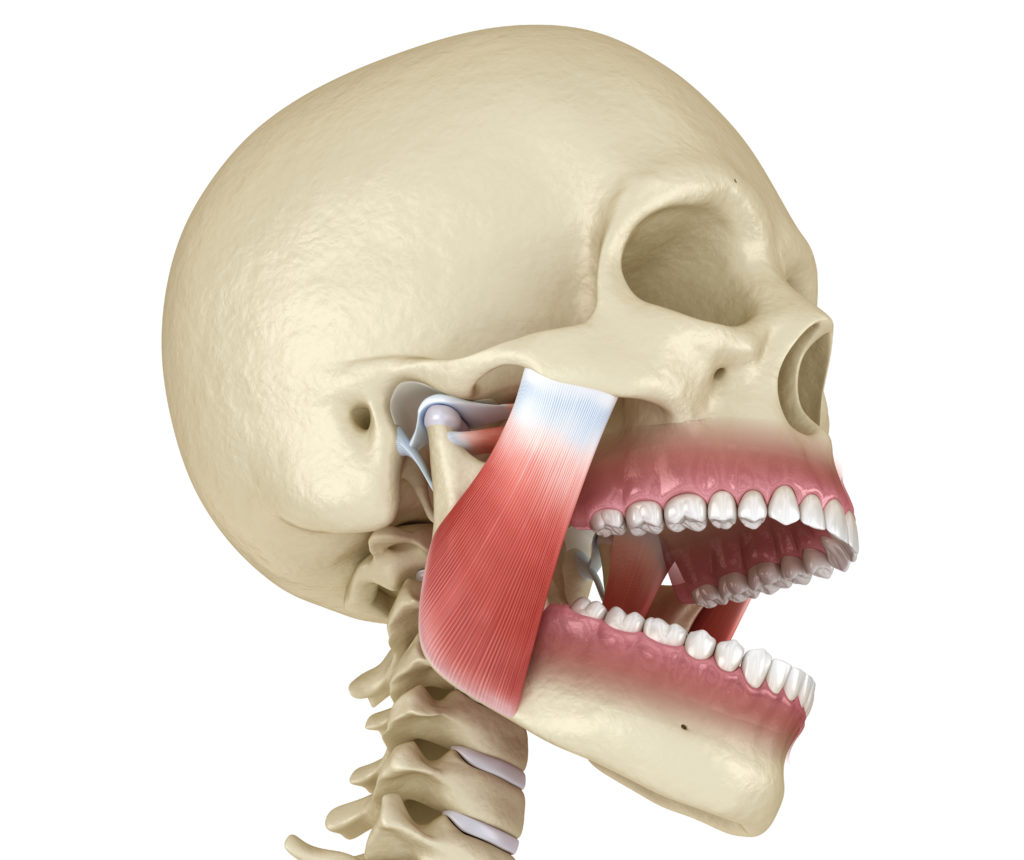TMJ Treatments

The primary muscle
of mastication typically
enlarged in cases
of grinding and clenching.
of mastication typically
enlarged in cases
of grinding and clenching.
where clicking or
grinding may be
experienced as the disc
dislocates within the joint
grinding may be
experienced as the disc
dislocates within the joint
UNDERSTANDING TMJ DISORDERS
Temporomandibular Joint (TMJ) Disorders often surface as a persistent aching in your jaw, a wearing down of your teeth, or even as unexplained headaches. It encompasses a range of disorders that can impact the jaw joint and the muscles that control jaw movement. Understanding the nuances of this disorder is pivotal, and at Smile Design Dental, we ensure an individualised approach to treating TMJ disorders.
Why Addressing TMJ Disorders Is Crucial
TMJ disorders, if left untreated, can lead to severe complications, including irreversible damage to the jaw joint and teeth. The symptoms can impede your day-to-day activities, reducing the quality of your life. That’s why at Smile Design Dental, we champion preventative care to keep such issues at bay, helping you maintain a healthy, happy smile.
Splint Therapy - Your Shield Against TMJ Disorders
Splint therapy stands as the foremost treatment approach for those grappling with nocturnal grinding or clenching habits, as well as for individuals who have progressed to experiencing Temporomandibular Joint Disorder (TMD). Here’s why splints could be your go-to solution:
- Customised to Your Needs: Each splint is carefully crafted to snugly fit your upper teeth, providing a cushion that protects your teeth and jaw joint from the repercussions of grinding and clenching.
- A Restful Night’s Sleep: Despite being a stalwart guard against grinding, a well-designed splint promises unobtrusive comfort, allowing you to sleep peacefully night after night.
- A Gradual Adaptation: Though it might feel slightly strange initially, most patients find themselves adapting to the splint within a few weeks, making it a convenient solution to a potentially debilitating problem.

Grinding muscles - treating
TMD /grinding /clenching
or for facial sliming
TMD /grinding /clenching
or for facial sliming
MUSCLE RELAXANTS - A GENTLE ALTERNATIVE
For those seeking an alternative to splints, muscle relaxants present a viable option. Here’s why you might consider this route:
- Targeted Action: Muscle relaxants work by reducing the over activity of the muscles responsible for clenching and grinding, directly addressing the root of the problem.
- Simple and Effective: Administered through injections into the jaw muscles (the masseters or temporalis), this treatment offers a straightforward approach to mitigating the effects of TMJ disorders. This treatment also has the benefit of lasting all through the day, with an action lasting 3-6 months for most people.
- A Complementary Approach: Muscle relaxants can work excellently in tandem with other treatments, providing a comprehensive solution to TMJ disorders.
Comprehensive Approach At Smile Design Dental
At Smile Design Dental, we pride ourselves in offering a holistic approach to treating TMJ disorders. Our comprehensive treatment modalities include:
- Consultative Approach: A detailed consultation with Dr. Danielle Bolger to understand the depth of the issue and to tailor a treatment plan that aligns with your needs. We also investigate the causes of your TMD and whether other studies are required here.
- Complementary Treatments: Alongside splints and muscle relaxants, we offer therapies that can work synergistically to bring you relief.
- Guided Support: Our team stands with you through your treatment journey, offering advice, and support to ensure the best possible outcome.
POST-TREATMENT CARE
After your treatment, we offer guidance on how to maintain the health of your jaw joints and ensure long-lasting relief from TMJ disorders. From exercises to lifestyle advice, we ensure you are equipped to maintain a TMJ-disorder-free life. At Smile Design Dental, we are steadfast in our commitment to offering solutions that prioritise your comfort and well-being. Reach out to us to set out on your path to recovery from TMJ disorders.
Book Your Consultation Today
Frequently Asked Questions
TMJ disorder refers to a condition that affects the temporomandibular joint, which connects your jaw to your skull. Symptoms may include aching facial pain, difficulty chewing, joint sounds, and locking of the joint, among others. Diagnosing TMJ disorders involves a detailed examination at our clinic where our team will assess your symptoms and perform a physical examination to identify the issues accurately.
A splint, also known as a dental guard or oral appliance, is custom-designed to fit over your upper teeth. Worn primarily during the night, it acts as a cushion that prevents teeth grinding and clenching, which are common causes of TMJ disorders, and allows a free range of movement. The splint facilitates a better jaw alignment and reduces the strain on the TMJ, helping alleviate the symptoms of the disorder. It stops you from locking into positions that could add strain to your joints over time and reduces the amount of force that can be produced from your grinding muscles.
While muscle relaxants are generally safe and effective in treating TMJ disorders, there could be side effects like injecting unintended muscle, minor discomfort at the injection site or developing a slight headache that day, the dose may need to be adjusted to be effective for you, or additional grinding muscles may compensate to take over these forces. Typically, we will inject the largest grinding muscles, the masseters, however some people will require an additional dose for the temporalis (located higher near the temples) as these muscles can take over occasionally. A more pleasant side effect can result in slimming of the lower portion of the face. It is always recommended to discuss your medical history and any concerns with Dr. Bolger to ensure the most suitable and safe treatment plan for you.
Most patients adapt to wearing a splint within a few weeks. Initially, there might be a slight unfamiliar feeling, but with regular use, it becomes a comfortable part of your nightly routine. It’s important to be patient and give yourself time to get used to the new appliance.
Muscle relaxant treatment effects can last anywhere from three to six months, depending on individual response to the treatment. Since muscle relaxants are not permanent, the treatment is indeed reversible. Regular consultations will allow us to assess your progress and adjust treatment plans as necessary.
Absolutely, many patients undergoing TMJ treatments may have other ongoing dental treatments or issues. Dr. Bolger and our skilled team at Smile Design Dental will work together to create a harmonised treatment plan that takes into account all your dental needs, ensuring safety and efficacy.
Our Services
Mouthguards

